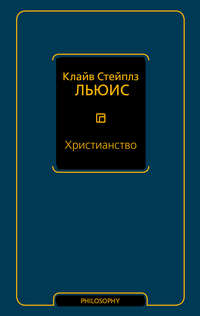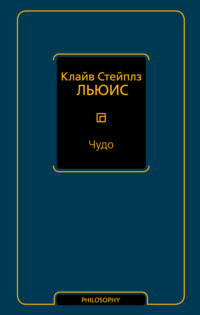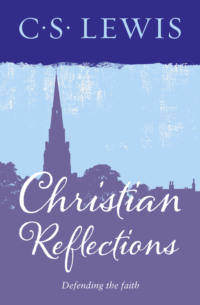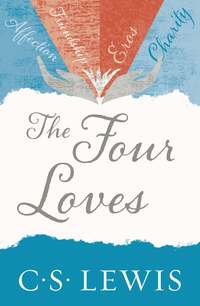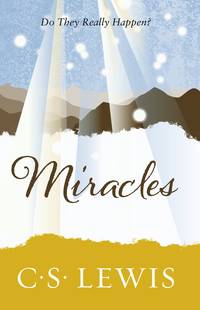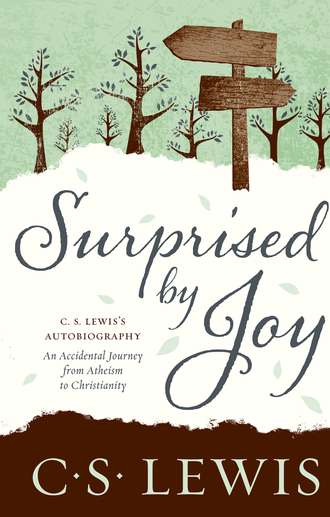
Полная версия
Surprised by Joy
First, I learned, if not friendship, at least gregariousness. There had been bullying at the school when my brother first went there. I had my brother’s protection for my first few terms (after which he left to go to a school we may call Wyvern) but I doubt if it was necessary. During those last declining years of the school we boarders were too few and too badly treated to do or suffer much in that way. Also, after a certain time, there were no new boys. We had our quarrels, which seemed serious enough at the time; but long before the end we had known one another too long and suffered too much together not to be, at the least, very old acquaintance. That, I think, is why Belsen did me, in the long run, so little harm. Hardly any amount of oppression from above takes the heart out of a boy like oppression from his fellows. We had many pleasant hours alone together, we five remaining boarders. The abandonment of organised games, though a wretched preparation for the public school life to which most of us were destined, was at the time a great blessing. We were sent out for walks alone on half holidays. We did not do much walking. We bought sweets in drowsy village shops and pottered about on the canal bank or sat at the brow of a railway cutting watching a tunnel-mouth for trains. Hertfordshire came to look less hostile. Our talk was not bound down to the narrow interests which satisfy public school boys; we still had the curiosity of children. I can even remember from those days what must have been the first metaphysical argument I ever took part in. We debated whether the future was like a line you can’t see or like a line that is not yet drawn. I have forgotten which side I took though I know that I took it with great zeal. And always there was what Chesterton calls ‘the slow maturing of old jokes’.
The reader will notice that school was thus coming to reflect a pattern I had already encountered in my home life. At home, the bad times had drawn my brother and me closer together; here, where the times were always bad, the fear and hatred of Oldie had something of the same effect upon us all. His school was in some ways very like Dr Grimstone’s school in Vice Versa; but unlike Dr Grimstone’s it contained no informer. We stood foursquare against the common enemy. I suspect that this pattern, occurring twice and so early in my life, has unduly biassed my whole outlook. To this day the vision of the world which comes most naturally to me is one in which ‘we two’ or ‘we few’ (and in a sense ‘we happy few’) stand together against something stronger and larger. England’s position in 1940 was to me no surprise; it was the sort of thing that I always expect. Hence while friendship has been by far the chief source of my happiness, acquaintance or general society has always meant little to me, and I cannot quite understand why a man should wish to know more people than he can make real friends of. Hence, too, a very defective, perhaps culpably defective, interest in large impersonal movements, causes and the like. The concern aroused in me by a battle (whether in story or in reality) is almost in an inverse ratio to the number of the combatants.
In another way too Oldie’s school presently repeated my home experience. Oldie’s wife died; and in term time. He reacted to bereavement by becoming more violent than before; so much so that Wee Wee made a kind of apology for him to the boys. You will remember that I had already learned to fear and hate emotion; here was a fresh reason to do so.
But I have not yet mentioned the most important thing that befell me at Oldie’s. There first I became an effective believer. As far as I know, the instrument was the church to which we were taken twice every Sunday. This was high ‘Anglo-Catholic’. On the conscious level I reacted strongly against its peculiarities - was I not an Ulster Protestant, and were not these unfamiliar rituals an essential part of the hated English atmosphere? Unconsciously, I suspect, the candles and incense, the vestments and the hymns sung on our knees, may have had a considerable, and opposite, effect on me. But I do not think they were the important thing. What really mattered was that I here heard the doctrines of Christianity (as distinct from general ‘uplift’) taught by men who obviously believed them. As I had no scepticism, the effect was to bring to life what I would already have said that I believed. In this experience there was a great deal of fear. I do not think there was more than was wholesome or even necessary; but if in my books I have spoken too much of Hell, and if critics want a historical explanation of the fact, they must seek it not in the supposed Puritanism of my Ulster childhood but in the Anglo-Catholicism of the church at Belsen. I feared for my soul; especially on certain blazing moonlight nights in that curtainless dormitory - how the sound of other boys breathing in their sleep comes back! The effect, so far as I can judge, was entirely good. I began seriously to pray and to read my Bible and to attempt to obey my conscience. Religion was among the subjects which we often discussed; discussed, if my memory serves me, in an entirely healthy and profitable way, with great gravity and without hysteria, and without the shame-facedness of older boys. How I went back from this beginning you shall hear later.
Intellectually, the time I spent at Oldie’s was almost entirely wasted; if the school had not died, and if I had been left there two years more, it would probably have sealed my fate as a scholar for good. Geometry and some pages in West’s English Grammar (but even those I think I found for myself) are the only items on the credit side. For the rest, all that rises out of the sea of arithmetic is a jungle of dates, battles, exports, imports and the like, forgotten as soon as learned and perfectly useless had they been remembered. There was also a great decline in my imaginative life. For many years Joy (as I have defined it) was not only absent but forgotten. My reading was now mainly rubbish; but as there was no library at the school we must not make Oldie responsible for that. I read twaddling school-stories in The Captain. The pleasure here was, in the proper sense, mere wish-fulfilment and fantasy; one enjoyed vicariously the triumphs of the hero. When the boy passes from nursery literature to school-stories he is going down, not up. Peter Rabbit pleases a disinterested imagination, for the child does not want to be a rabbit, though he may like pretending to be a rabbit as he may later like acting Hamlet; but the story of the unpromising boy who became captain of the First Eleven exists precisely to feed his real ambitions. I also developed a great taste for all the fiction I could get about the ancient world: Quo Vadis, Darkness and Dawn, The Gladiators, Ben Hur. It might be expected that this arose out of my new concern for my religion, but I think not. Early Christians came into many of these stories, but they were not what I was after. I simply wanted sandals, temples, togas, slaves, emperors, galleys, amphitheatres; the attraction, as I now see, was erotic, and erotic in rather a morbid way. And they were mostly, as literature, rather bad books. What has worn better, and what I took to at the same time, is the work of Rider Haggard; and also the ‘scientifiction’ of H. G. Wells. The idea of other planets exercised upon me then a peculiar, heady attraction, which was quite different from any other of my literary interests. Most emphatically it was not the romantic spell of Das Ferne. ‘Joy’ (in my technical sense) never darted from Mars or the Moon. This was something coarser and stronger. The interest, when the fit was upon me, was ravenous, like a lust. This particular coarse strength I have come to accept as a mark that the interest which has it is psychological, not spiritual; behind such a fierce tang there lurks, I suspect, a psychoanalytical explanation. I may perhaps add that my own planetary romances have been not so much the gratification of that fierce curiosity as its exorcism. The exorcism worked by reconciling it with, or subjecting it to, the other, the more elusive, and genuinely imaginative, impulse. That the ordinary interest in scientifiction is an affair for psychoanalysts is borne out by the fact that all who like it, like it thus ravenously, and equally by the fact that those who do not, are often nauseated by it. The repulsion of the one sort has the same coarse strength as the fascinated interest of the other and is equally a tell-tale.
So much for Oldie’s; but the year was not all term. Life at a vile boarding-school is in this way a good preparation for the Christian life, that it teaches one to live by hope. Even, in a sense, by faith, for at the beginning of each term, home and the holidays are so far off that it is as hard to realise them as to realise heaven. They have the same pitiful unreality when confronted with immediate horrors. To-morrow’s geometry blots out the distant end of term as tomorrow’s operation may blot out the hope of Paradise. And yet, term after term, the unbelievable happened. Fantastical and astronomical figures like ‘This time six weeks’ shrank into practicable figures like ‘This time next week’, and then ‘This time to-morrow’, and the almost supernatural bliss of the Last Day punctually appeared. It was a delight that almost demanded to be stayed with flagons and comforted with apples; a delight that tingled down the spine and troubled the belly and at moments went near to stopping the breath. Of course this had a terrible and equally relevant reverse side. In the first week of the holidays we might acknowledge that term would come again - as a young man in peace time, in full health, acknowledges that he will one day die. But like him we could not even by the grimmest memento mori be brought to realise it. And there too, each time, the unbelievable happened. The grinning skull finally peered through all disguises; the last hour, held at bay by every device our will and imaginations knew, came in the end, and once more it was the bowler-hat, the Eton collar, the knickerbockers, and (clop-clop-clop-clop) the evening drive to the quay. In all seriousness I think that the life of faith is easier to me because of these memories. To think, in sunny and confident times, that I shall die and rot, or to think that one day all this universe will slip away and become memory (as Oldie slipped away into memory three times a year, and with him the canes and the disgusting food, the stinking sanitation and the cold beds) - this is easier to us if we have seen just that sort of thing happening before. We have learned not to take present things at their face value.
In attempting to give an account of our home life at this time I am troubled by doubts about chronology. School affairs can to some extent be dated by surviving records, but the slow, continuous unfolding of family life escapes them. Our slight alienation from our father imperceptibly increased. In part no one was to blame; in a very great part we were to blame. A temperamental widower, still prostrated by the loss of his wife, must be a very good and wise man indeed if he makes no mistakes in bringing up two noisy and mischievous schoolboys who reserve their confidence wholly for each other. And my father’s good qualities as well as his weaknesses incapacitated him for the task. He was far too manly and generous to strike a child for the gratification of his anger; and he was too impulsive ever to punish a child in cold blood and on principle. He therefore relied wholly on his tongue as the instrument of domestic discipline. And here that fatal bent towards dramatisation and rhetoric (I speak of it the more freely since I inherit it) produced a pathetic yet comic result. When he opened his mouth to reprove us he no doubt intended a short well-chosen appeal to our common sense and conscience. But alas, he had been a public speaker long before he became a father. He had for many years been a public prosecutor. Words came to him and intoxicated him as they came. What actually happened was that a small boy who had walked on damp grass in his slippers or left a bathroom in a pickle found himself attacked with something like Cicero on Catiline or Burke on Warren Hastings; simile piled on simile, rhetorical question on rhetorical question, the flash of an orator’s eye and the thundercloud of an orator’s brow, the gestures, the cadences and the pauses. The pauses might be the chief danger. One was so long that my brother, quite innocently supposing the denunciation to have ended, humbly took up his book and resumed his reading; a gesture which my father (who had after all only made a rhetorical miscalculation of about a second and a half) not unnaturally took for ‘cool, premeditated insolence’. The ludicrous disproportion between such harangues and their occasions puts me in mind of the advocate in Martial who thunders about all the villains of Roman history while meantime lis est de tribus capellis -
This case, I beg the court to note, Concerns a trespass by a goat.
My poor father, while he spoke, forgot not only the offence, but the capacities, of his audience. All the resources of his immense vocabulary were poured forth. I can still remember such words as ‘abominable’, ‘sophisticated’ and ‘surreptitious’. You will not get the full flavour unless you know an angry Irishman’s energy in explosive consonants and the rich growl of his R’s. A worse treatment could hardly have been applied. Up to a certain age these invectives filled me with boundless terror and dismay. From the wilderness of the adjectives and the welter of the unintelligible, emerged ideas which I thought I understood only too well, as I heard with implicit and literal belief that our Father’s ruin was approaching, that we should all soon beg our bread in the streets, that he would shut up the house and keep us at school all the year round, that we should be sent to the colonies and there end in misery the career of crime on which we had, it seemed, already embarked. All security seemed to be taken from me; there was no solid ground beneath my feet. It is significant that at this time if I woke in the night and did not immediately hear my brother’s breathing from the neighbouring bed, I often suspected that my father and he had secretly risen while I slept and gone off to America - that I was finally abandoned. Such was the effect of my father’s rhetoric up to a certain age; then, quite suddenly, it became ridiculous. I can even remember the moment of the change, and the story well illustrates both the justice of my father’s anger and the unhappy way in which he expressed it. One day my brother decided it would be a good thing to make a tent. Accordingly we procured a dust-sheet from one of the attics. The next step was to find uprights; the step-ladder in the wash-house suggested itself. For a boy with a hatchet it was the work of a moment to reduce this to a number of disconnected poles. Four of these were then planted in the earth and the sheet draped over them. To make sure that the whole structure was really reliable my brother then tried sitting on the top of it. We remembered to put away the ragged remains of the sheet but quite forgot about the uprights. That evening, when my father had come home from work and dined, he went for a stroll in the garden, accompanied by us. The sight of four slender wooden posts rising from the grass moved in him a pardonable curiosity. Interrogation followed; on this occasion we told the truth. Then the lightnings flashed and the thunder roared; and all would have gone now as it had gone on a dozen previous occasions, but for the climax - ‘Instead of which I find you have cut up the step-ladder. And what for, forsooth? To make a thing like an abortive Punch-and-Judy show.’ At that moment we both hid our faces; not, alas, to cry.
As will be seen from this anecdote one dominant factor in our life at home was the daily absence of our father from about nine in the morning till six at night. For the rest of the day we had the house to ourselves, except for the cook and housemaid with whom we were sometimes at war and sometimes in alliance. Everything invited us to develop a life that had no connection with our father. The most important of our activities was the endless drama of Animal-Land and India, and this of itself isolated us from him.
But I must not leave the reader under the impression that all the happy hours of the holidays occurred during our father’s absence. His temperament was mercurial, his spirits rose as easily as they fell, and his forgiveness was as thorough-going as his displeasure. He was often the most jovial and companionable of parents. He could ‘play the fool’ as well as any of us, and had no regard for his own dignity, ‘conned no state’. I could not, of course, at that age see what good company (by adult standards) he was, his humour being of the sort that requires at least some knowledge of life for its full appreciation; I merely basked in it as in fine weather. And all the time there was the sensuous delight of being at home, the delight of luxury - ‘civilisation’, as we called it. I spoke just now of Vice Versa. Its popularity was surely due to something more than farce. It is the only truthful school story in existence. The machinery of the Garuda Stone really serves to bring out in their true colours (which would otherwise seem exaggerated) the sensations which every boy had on passing from the warmth and softness and dignity of his home life to the privations, the raw and sordid ugliness, of school. I say ‘had’ not ‘has’; for perhaps homes have gone down in the world and schools gone up since then.
It will be asked whether we had no friends, no neighbours, no relatives. We had. To one family in particular our debt is so great that it had better be left, with some other matters, to the next chapter.
1 This punishment was for a mistake in a geometrical proof.
3 MOUNTBRACKEN AND CAMPBELL
For all these fair people in the hall were in their first age; none happier under the heaven; their king, the man of noblest temper. It would be a hard task to-day to find so brave a fellowship in any castle.
Gawain and the Green Knight
To speak of my nearer relatives is to remind myself how the contrast of Lewis and Hamilton dominated my whole early life. It began, for me, with the grandparents. Grandfather Lewis, deaf, slow-moving, humming his psalm chants, much concerned for his health and prone to remind the family that he would not be with them long, is contrasted with Grandmother Hamilton, the sharp-tongued, sharp-witted widow, full of heterodox opinions (even, to the scandal of the whole connection, a Home Ruler), every inch a Warren, indifferent to convention as only an old Southern Irish aristocrat could be, living alone in a large tumble-down house with half a hundred cats for company. To how many an innocent conversational gambit did she reply, ‘You’re talking great nonsense’? Born a little later, she would, I think, have been a Fabian. She met vague small talk with ruthless statements of ascertainable fact and well-worn maxims with a tart demand for evidence. Naturally, people called her eccentric. Coming down a generation I find the same opposition. My father’s elder brother ‘Uncle Joe’, with his family of two boys and three girls, lived very close to us while we were at the Old House. His younger son was my earliest friend, but we drifted apart as we grew older. Uncle Joe was both a clever man and a kind, and especially fond of me. But I remember nothing that was said by our elders in that house; it was simply ‘grown up’ conversation - about people, business, politics, and health, I suppose. But ‘Uncle Gussie’ - my mother’s brother, A. W. Hamilton - talked to me as if we were of an age. That is, he talked about Things. He told me all the science I could then take in, clearly, eagerly, without silly jokes and condescensions, obviously liking it as much as I did. He thus provided the intellectual background for my reading of H. G. Wells. I do not suppose he cared for me as a person half so much as Uncle Joe did; and that (call it an injustice or not) was what I liked. During these talks our attention was fixed not on one another but on the subject. His Canadian wife I have already mentioned. In her also I found what I liked best - an unfailing, kindly welcome without a hint of sentimentality, unruffled good sense, the unobtrusive talent for making all things at all times as cheerful and comfortable as circumstances allowed. What one could not have one did without and made the best of it. The tendency of the Lewises to re-open wounds and to rouse sleeping dogs was unknown to her as to her husband.
But we had other kin who mattered to us far more than our aunts and uncles. Less than a mile from our home stood the largest house I then knew, which I will here call Mountbracken, and there lived Sir W. E. Lady E. was my mother’s first cousin and perhaps my mother’s dearest friend, and it was no doubt for my mother’s sake that she took upon herself the heroic work of civilising my brother and me. We had a standing invitation to lunch at Mountbracken whenever we were at home; to this, almost entirely, we owe it that we did not grow up savages. The debt is not only to Lady E. (‘Cousin Mary’) but to her whole family; walks, motor-drives (in those days an exciting novelty), picnics, and invitations to the theatre were showered on us, year after year, with a kindness which our rawness, our noise, and our unpunctuality never seemed to weary. We were at home there almost as much as in our own house, but with this great difference, that a certain standard of manners had to be kept up. Whatever I know (it is not much) of courtesy and savoir faire I learned at Mountbracken.
Sir W. (‘Cousin Quartus’) was the eldest of several brothers who owned between them one of the most important industrial concerns in Belfast. He belonged in fact to just that class and generation of which the modern man gets his impressions through Galsworthy’s Forsytes. Unless Cousin Quartus was very untrue to type (he may well have been) that impression is grossly unjust. No one less like a Galsworthian character ever existed. He was gracious, childlike, deeply and religiously humble, and abounding in charity. No man could feel more fully his responsibility to dependants. He had a good deal of boyish gaiety about him; at the same time I always felt that the conception of duty dominated his life. His stately figure, his grey beard, and his strikingly handsome profile make up one of the most venerable images in my memory. Physical beauty was indeed common to most of the family. Cousin Mary was the very type of the beautiful old lady, with her silver hair and her sweet Southern Irish voice; foreigners must be warned that this resembles what they call a ‘brogue’ about as little as the speech of a Highland gentleman resembles the jargon of the Glasgow slums. But it was the three daughters whom we knew best. All three were ‘grown up’ but in fact much nearer to us in age than any other grown-ups we knew, and all three were strikingly handsome. H., the eldest and the gravest, was a Juno, a dark queen who at certain moments looked like a Jewess. K. was more like a Valkyrie (though all, I think, were good horsewomen) with her father’s profile. There was in her face something of the delicate fierceness of a thoroughbred horse, an indignant fineness of nostril, the possibility of an excellent disdain. She had what the vanity of my own sex calls a ‘masculine’ honesty; no man ever was a truer friend. As for the youngest, G., I can only say that she was the most beautiful woman I have ever seen, perfect in shape and colour and voice and every movement - but who can describe beauty? The reader may smile at this as the far-off echo of a precocious calf-love, but he will be wrong. There are beauties so unambiguous that they need no lens of that kind to reveal them; they are visible even to the careless and objective eyes of a child. (The first woman who ever spoke to my blood was a dancing mistress at a school that will come in a later chapter.)
In some ways Mountbracken was like our Father’s house. There too we found the attics, the indoor silences, the endless bookshelves. In the early days, when we were still only a quarter tamed, we often neglected our hostesses and rummaged on our own; it was there that I found Lubbock’s Ants, Bees and Wasps. But it was also very different. Life there was more spacious and considered than with us, glided like a barge where ours bumped like a cart.



